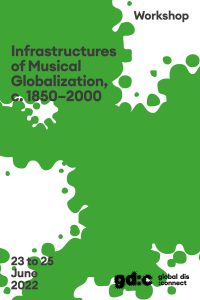23-25 Jun 22, Workshop: Infrastructures of Musical Globalization, c. 1850–2000

Infrastructures rarely come to mind while making or listening to music. This holds equally true for discovering or playing with unfamiliar sounds from different world regions. As an ephemeral and affective experience, music of whatever origin is difficult to capture, locate, and pin down. And yet, without the emergence, development, transformation, and deterioration of infrastructures, such experiences would have taken quite a different path.
The workshop delved into the material conditions as well as the explicit and implicit prerequisites of making music at a transnational and global level since the 19th century. It is these conditions and prerequisites we approach as musical infrastructures. Often, musical infrastructures as places and institutions – whether public, private, or anything in between – have been taken for granted by historical and present actors involved in musical life. They only receive greater attention if they do not meet artistic, economic, political, or public expectations. Hence, the presence, lack, or transformations of infrastructures are inextricably intertwined with the production of musical culture. This perspective pilots us to issues of law and (global) governance, industry and organization structures, technology and media, transportation, occupational careers, and musical markets.
For this workshop, we assumed that that the emergence, flourishing, dissemination, and decline of musical cultures depend on the musical infrastructures that condition them. Understanding musical infrastructures as driving forces, counter forces, and lateral forces of musical practices, it is their forms and means, their reach, and ultimately their dis:connectivities we have explored more systematically.
You can find the full programme HERE. For more information, please contact the conveners.
Martin Rempe
Fellow KHK „global disconnect“
LMU München
m.rempe@lmu.de





